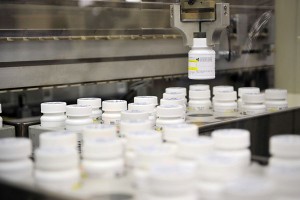By Inaam El-Adawy and Nihal Mounir
Companies are to receive a €10,000 subsidy in order to obtain the certifications needed to conform to international standards. President of the Pharmaceutical Exports Council (PEC,) Neveen Hossam, said that the IBRD set a number of conditions for the subsidy; it insisted that the Egyptian Pharmaceutical Foundation include at least 200 workers, that the head of its board of directors be a woman, that loans be repaid in euros, and that the bank has to right to monitor the development of companies that receive the subsidy.

Hossam attributed the IBRD’s interest in the pharmaceutical market to the fact that it accounts for 20% of GDP in nearly every country in the world. The subsidy includes provisions to guarantee that the state obtains enough pharmaceutical projects to meet domestic needs, with the surplus for export. She added that the PEC is interested in building partnerships with international business associations and the IMF in order to penetrate African markets, especially East Africa which does not receive more than 4% of Egyptian exports. The PEC hopes to raise the value of Egyptian pharmaceutical products to $500 million by the end of 2012.
The forthcoming pharmaceutical exhibition in the Kenyan capital, Nairobi, which will take place between November 29th and December 2nd of the current year, is expected to attract more African companies to the Egyptian market.
Mohamed Faruq, the President of the Board of Directors of the EIPICO pharmaceutical company, said that Egyptian pharmaceutical companies are capable of exporting their products worldwide if they receive help from the Ministry of Industry and the Foreign Ministry. Egyptian companies currently face fierce competition from multinational pharmaceutical companies.
Riad Armanious, President of EVA PHARMA, called for a short term, six month strategy to increase Egyptian exports to African countries, especially given the new competition brought by the entry of multinational companies into the African market.
Awad Gaber, President of the Export Council for Pharmaceutical Industries, called for new policies to support the medical sector. The market is open for new exports, he noted, especially given the political situation in Syria, which had been the primary source of pharmaceutical products for the Iraqi market.
Iraq and Sudan currently receive 14% percent of Egyptian pharmaceutical exports. Saudi Arabia and Yemen receive 13% while Romania receives 10%. Turkey receives 7% with Pakistan receiving 4% and India 3%. Libya receives 2% of Egyptian exports.




